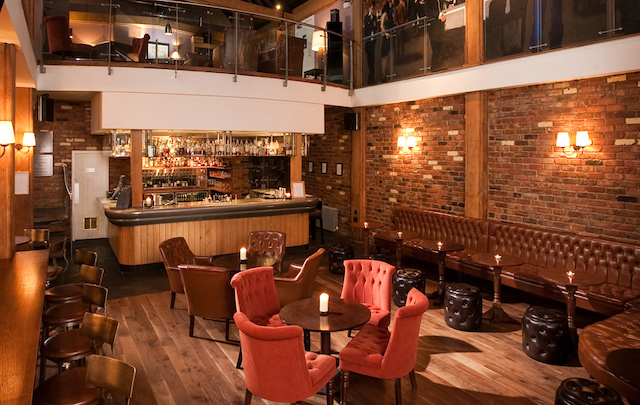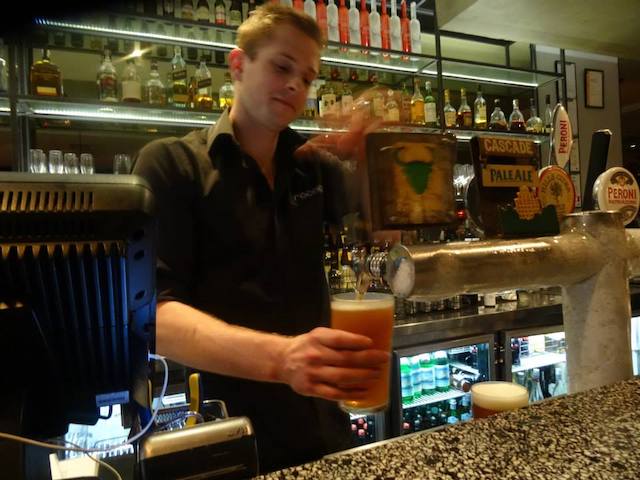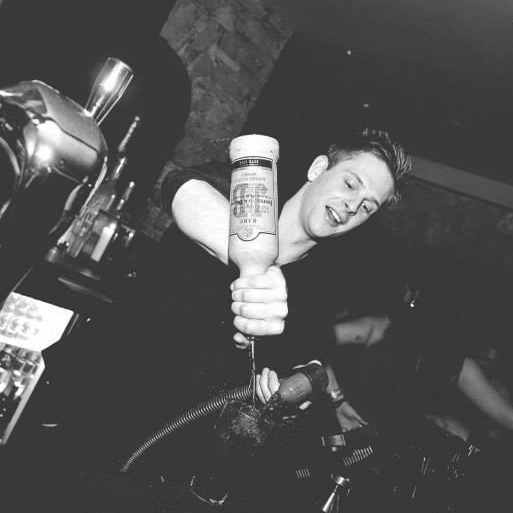There’s no doubt about it, the lessons you learn working as a bartender are powerful. You learn about people, you learn about yourself, you learn about life, and you learn a set of skills that can take you around the world. So whether you’re in this for the long haul, just getting started, or using it as a side gig while you work towards something else, here are some of the biggest lessons I’ve learned from years of bartending.
Hopefully, you get to learn them, too.
1. Bartending teaches you confidence
To kick this list off, I thought I’d start with one of the more personal and life-changing lessons I’ve learned from bartending. Bartending teaches you confidence, especially if you experience any form of social anxiety.
Why?
At the end of the day, confidence is the result of competence and bartending teaches you how to be incredibly competent with people because you’re forced to interact (and interact well) with them every single day.
You learn how to socialize and empathize with people from all walks of life. You learn how to make people laugh, and entertain them with silly stories. And you also learn how to deal with these same people in their more “extreme” circumstances (e.g., when they’re drunk and trying to start a fight).
This kind of experience is invaluable. And regardless of what you end up doing, it’s going to come in handy. After all, almost everything we do in life requires some form of interaction with people. So the better we get at it, the more confident we’ll feel, and dare I say, the happier we’ll be.
2. People remember how you make them feel
This is one of those lessons that took me a lot longer to figure out than I care to admit. It’s also one of the most important lessons anyone can learn if they work in the service industry or with people in general.
People remember how you make them feel, not what you say or what you do.
Look at it like this, who do you think you’re going to remember? The bartender who crafted you the perfect drink, but paid you very little attention? Or the bartender who made you a poorer quality drink, but made you feel welcome when you arrived, took the time to find out what you like to drink, and then told you a funny joke or a story while you waited?
Of course you’re going to remember bartender No. 2.
That’s why this lesson is so important to learn because you don’t want to become the bartender who focuses exclusively on crafting the perfect cocktail. They don’t go very far in this industry … trust me, I’ve worked with them! Whenever you’re serving your guests or talking with people, you should focus on making them feel good. If you do, I guarantee you’ll do well in this world.
3. Organization skills are crucial
Have you ever heard a bartender say, “An organized bar leads to a better service?”
It’s true and what they mean is this: when the bar is well organized, everything runs more smoothly. If everything has its place and everyone knows where everything is, bartenders will be able to quickly find ingredients, equipment, and bottles, helping them do everything else faster, like making a drink.
This will lead to fewer complications down the road and more satisfied customers because they won’t have to wait as long for a drink. The bartenders will also feel less stressed because they don’t have to stop and think as often.
On the other hand, when a bar is disorganized, the opposite occurs. Bartenders won’t intuitively know where everything is so they’ll end up spending five minutes looking around for something. This is going to cause them unnecessary stress and it will also annoy the customer because they’ll have to wait longer. Angry customers will further stress the bartender which will ultimately lead to a much poorer service overall.
4. Our habits dictate our lives
I think about this lesson often and the more I go through life, the more I realise it’s true. Our habits dictate our lives so it’s important that we cultivate the right ones.
The first time I realised how important our habits were was when I was managing a bar in Melbourne. I was responsible for training all the bartenders. Bartenders who were both new to the industry and those who had a ton of experience.
What I quickly noticed was that the older, more experienced bartenders were much more difficult to train. These bartenders had cultivated bad habits from previous jobs and it didn’t matter what or how I told them, they never changed.
On the other hand, the bartenders new to the industry were easy to train. They didn’t have any preconceptions about what they should do or how they should do it, so they just did what I said. And even though these bartenders had less experience to start off with, they ended up becoming far more effective than their more experienced colleagues.
The reason is that habits are hard to change. It’s much easier to cultivate the right habits from the beginning. That doesn’t mean that you can’t change bad habits, you can. But it takes longer and you need to be disciplined if you’re going to succeed.
This is the reason why I NEVER cut corners when I’m cleaning and closing down the bar anymore. I know that as soon as I do, it’s going to be much harder to start doing it properly again.
 Inside the Hotel Du Vin, a bar Blake worked at in Brighton, U.K.
Inside the Hotel Du Vin, a bar Blake worked at in Brighton, U.K.
5. Make sure you travel
One of the best parts about being a bartender is that our jobs are pretty much the same everywhere we go and that you don’t need to any special requirements to be one. That makes long-term traveling A LOT easier. It means that you can extend your travels for as long as you want because you know that you’ll be getting paid as you go.
That freedom and flexibility to travel is one of the main reasons why I wanted to become a bartender in the first place. I realised that when you learn how to tend the bar, you essentially learn a set of skills that can take you around the world. That’s why I highly recommend every bartender to take advantage their unique profession to travel. You never know what you’ll end up doing in the future and most jobs won’t give you this much freedom.
So you should take advantage of it now … even if it’s only a six-month stint working in a different country/state, it’s going to be worth it.
6. We can train our senses
Leonardo Da Vinci, arguably one of the most intelligent humans to ever walk the earth, once said “Train your senses.” When I first read this, I had no idea what he was talking about. I assumed that we were either born with developed senses, or we weren’t. And I thought that unfortunately, my senses of taste and smell were destined to be bad.
But after six years of bartending, I’ve realized I was wrong. You can train your senses and that training has become one of my favorite parts about bartending. In particular, we learn how to train our senses of taste and smell.
When we’re tasting cocktails, we learn how to balance the flavor profiles and detect the subtleties of sweetness, sourness, and bitterness. When we’re learning about beer, wine, and spirits, we learn how to recognise different flavours and different smells. And the more powerful our senses are, the more useful they become.
7. Standing beats sitting
Have you ever noticed that almost everyone who works a desk job eventually starts to complain about chronic lower back pain? And have you ever noticed that very few bartenders complain about the same thing? There’s a reason for this. Sitting down, hunched over a desk isn’t good for you. In fact, it’s really bad for your overall health and it’s especially bad for your spine.
Standing on your feet is better for your overall health than sitting behind a desk. Sure, you might have other problems to contend with, like aching feet. But as long as you take care of your feet, wear decent shoes, and work behind a bar with rubber safety mats, you’ll come out on top in the long run.
8. We work hard
This is one of the most common misconceptions outsiders have about bartending and the hospitality industry. But these misconceptions couldn’t be further from the truth. Bartenders (and hospitality workers in general) work hard. We have a lot of freedom in our work, and most of the time, it looks like we’re having fun. But we have to earn our money.
Things get stressful when you’ve got a million and one things to do, the phone starts ringing, a customer’s complaining, and the POS system decides to shut down. We often work 10-14 hour shifts without a break, with very little to eat, we’re constantly in motion, and we’re often so busy that we even forget to drink water.
So yes, we do work HARD!
And boy, is it worth it. Amidst the chaos, we have fun, laugh, yell, argue, score the occasional number, and depending on where you work, sink the occasional shot. On top of all that, we develop an insane work ethic, we learn how to manage stress and people, and we carry these habits with us for the rest of our lives.
If you’re not sure how important that last point is, see lesson No. 4.
 Blake pours a beer at restaurant/bar Rococo in Melbourne, Australia.
Blake pours a beer at restaurant/bar Rococo in Melbourne, Australia.
9. Working nights is a blessing, not a curse
When I tell people that I’m a bartender and that I work nights, sometimes until 3-4am, they usually say something like this, “I don’t know how you do it … I could never work those kind of hours. It must be really hard.”
What they don’t realise is that they spend most of their nights in bars anyway. And the biggest difference between my nights and theirs, is that I’m getting paid to be there. They also don’t realize that while they’re at work during the day, I get to do whatever I want. I can go surfing, take a language class, or catch up with friends. I can go to the doctor, go grocery shopping, or go to the gym while no one’s there, I don’t have to worry about traffic, and if I’m feeling lazy, or I’ve had a big night, I get to sleep in!
At one point, I forgot how great working nights were. But then I had to drive through peak hour traffic on one of my days off…
10. Being a bartender is, well, fun!
One of the most memorable quotes I’ve ever read in a bartending book comes from Gary “Gaz” Regan in “The Joy of Mixology.” In it, he wrote, “Once you find a profession you enjoy, you’ll never have to work another day in your life.” Sometimes, I don’t think we bartenders realize how lucky we are. And sometimes it takes leaving the industry before coming back again to have this realization.
Bartending is FUN! Seriously fun. And the opportunities and life we get to live because of it are incredible. Flexibility, freedom, job security, travel, socializing for a living, working with other great people, discovering our senses, and so much more.
Bartending teaches us how to live better and how to be better. And I’m so grateful that I’ve been a part of it for so long.
For more insight from Tom Blake, check out “The Ultimate Guide to Becoming a Bartender.”





